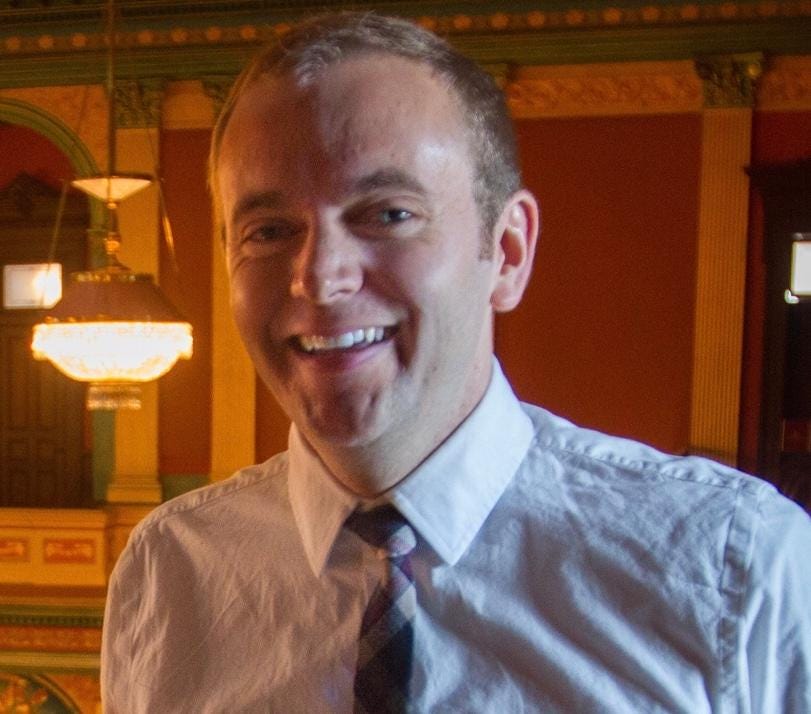Michigan health director: 'We are not done with this virus'
 Craig Mauger
Craig MaugerLansing — Michigan is "not done with" COVID-19 and is facing "increasing risk" as schools and universities reopen for classes this fall, says Robert Gordon, director of the Michigan Department of Health and Human Services.
Gordon and state epidemiologist Sarah Lyon-Callo appeared Wednesday before a joint committee of lawmakers who pressed them on Gov. Gretchen Whitmer's handling of virus-related data and business openings during the pandemic.
At one point, Sen. Kim LaSata, R-Bainbridge Township, questioned why much of the state hasn't advanced to the next phase of Whitmer's economic recovery plan, Phase 5, that would allow more businesses to reopen and larger gatherings. LaSata mentioned that the "numbers" are dropping, referring to statistics tracking the spread of the virus.

"Actually, the cases are not dropping," Gordon replied. "They basically have plateaued at an elevated level, significantly elevated relative to where we were in June."
At another point, Gordon said Michigan is "not done with this virus" and is facing "increasing risk" because of current circumstances.
"We have kids back in school. It’s a wonderful thing to get an education. It’s a source of risk," Gordon said. "We have college students, many of them back on campus, some of them back in classes. Education is really important. It’s a source of risk.
"You have cold weather coming. You have people going indoors. That’s inevitable. It’s a source of risk. You have flu season coming. That’s going to be a source of people getting sick, people going to the hospital. That’s another source of risk.”
He concluded, "It’s a complicated position that we’re in."

LaSata responded, "Everything we do every day, there's risk and I think people are just ready to make their own decisions."
Michigan reported its first cases of COVID-19 on March 10, nearly 200 days ago. The virus peaked in the state in April. At one point, Michigan ranked third nationally for deaths and cases. Now, it ranks 17th for cases and ninth for deaths, according to tracking by Johns Hopkins University.
Decisions made by Whitmer and sacrifices made by Michiganians have saved thousands of lives, Gordon told lawmakers.
Last week, the state confirmed 4,346 new COVID-19 cases and some health experts expect numbers to rise this fall as temperatures drop. Over the first 15 days of September, Michigan confirmed about four times as many new cases than it did over the first 15 days of June.
Whitmer's administration has gradually rolled back restrictions aimed at stemming the spread of the virus. In the last month, many schools have reopened to in-person instruction. On Sept. 3, she announced she would allow gyms to reopen at limited capacity and organized sports to resume.
But Republican lawmakers who control the state Legislature want to see eased restrictions on other businesses, including movie theaters and bowling alleys.
LaSata, a member of the Joint Select Committee on the COVID-19 Pandemic, argued that movie theaters and bowling alleys are prepared to reopen safely. She asked who decides which businesses get to open their doors and which don't.
Whitmer, the Democratic governor, makes the decisions and considers health and economic considerations, Gordon responded. It's important to examine the risks associated with each type of business, he said.
"There’s a high level of risk associated with bars," Gordon said. "There’s a lower but still significant risk associated with movie theaters."
Movie theaters in Michigan have been shuttered since March.

LaSata also asked why much of the state isn't in Phase 5 of the governor's reopening plan. That phase is described as "containing." Six of Michigan's eight "economic recovery" regions have been in Phase 4 of the plan since June 1. The fourth phase is described as "improving."
"During the Containing phase, new cases and deaths continue to decrease for an additional period of time," the governor's plan says. "At this point, the number of active cases has reached a point where infection from other members of the community is less common."
Gordon told lawmakers that Michigan's case numbers haven't dropped and the state is experiencing an "elevated plateau."
cmauger@detroitnews.com